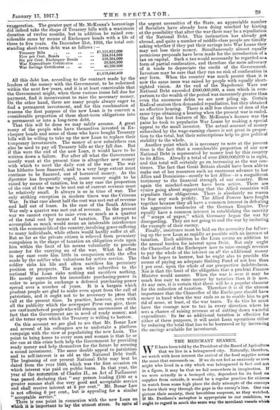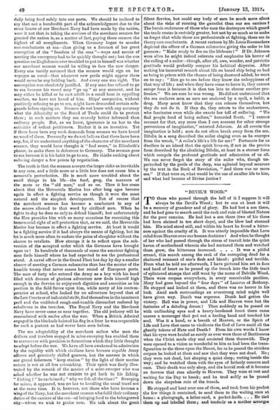THE MERCHANT SEAMEN.
WE have been told by the President of the Board of Agriculture that wo live in a beleaguered city. Naturally, therefore, we watch with keen interest the arrival of the food supplies across the moat that surrounds us. If we do not feel as anxiously as men might who lived in a city which was beleaguered in fact and not in a figure, it may be that we fail somewhere in imagination. If we were actually in a besieged city, dependent for its food on supplies from outside, it would be a regular practice for citizens to watch from some high place the daily attempts of the convoys to force their way through the gaps in the enemy's line. One can picture their anxiety, their breathless suspense, as they watched. If Mr. Prothero's metaphor is appropriate to our condition, we ought to regard in much the same way the merchant vessels whiab daily bring food safely into our ports. We should be inclined to say that not a hundredth part of the acknowledgment due to the stout hearts of our Merchant Navy had been made by the nation, were it not that in taking the services of the merchant seamen for granted the nation is, as a matter of fact, paying those seamen the highest of all compliments. When Germany began to murder non-combatants at sea—thus giving us a forecast of her great conception of the " freedom of the seas "—ways and means of meeting the emergency had to be quickly thought out; but the one question no Englishman ever troubled to put to himself was whether our merchant seamen would be willing to face the new danger. Every one tacitly assumed that the seamen would sign on for voyages as usual—that whatever new perils might appear there would never be any holding back. And every one was right. The assumption was absolutely justified. If any man has refused to go to sea because his vessel may " go up " at any moment, and he may either be killed or be cast adrift in a small boat in appalling weather, we have not heard of him. Ships' companies, without positively refusing to go to sea, might have demanded certain safe- guards before signing on. Seamen do not know with any accuracy what the Admiralty or the Board of Trade could do to protect them ; in such matters they are scarcely better informed than ordinary people. But, as we know, ignorance is no bar to the activities of ardent petitioners. Rather it is an incentive. Yet if there have been any such demands from seamen we have heard no word of them. Personally we do not believe that there have been any, for, if we understand anything of the character of the merchant seamen, they would have thought it " foul scorn," in Elizabeth's phrase, to make them in deference to Germany. The seaman goes to sea because it is his habit to go to sea. He thinks nothing about reducing danger a few points by negotiation.
The truth is that the seaman accepts the larger risks as inevitable In any case, and a little more or a little less does not cause him a. moment's perturbation. He is much more troubled about the Email things in his life—the food, grog, the manners of the mate or the " old man," and so on. Thus it has come about that the Mercantile Marine has after long ages become again in effect a fighting service as though it were the most natural and the simplest development. Not of course that the merchant seaman has become a combatant in any of the senses allowed to that word by civilized men. When he fights to-day he does so only to defend himself; but unfortunately the Hun provides him with so many occasions for exercising this Immemorial right of self-protection that, as we said, the Mercantile Marine has become in effect a fighting service. At least it would be a fighting service if it had always the means of fighting, but its lot is much more often to endure the pains of slaughter without the chance to retaliate. How strange it is to reflect upon the sub- version of the accepted order which the Germans have brought upon us I In hundreds of thousands of cases the amateur fighting man finds himself where he had expected to see the professional stand. A naval officer in the Grand Fleet has day by day a smaller chance of meeting a German submarine than has the master of the bumble tramp that never ceases her round of European ports. The man of forty who entered the Army as a boy with his head filled with dreams of glorious adventure now finds himself high enough in the Service to enjoy such dignities and amenities as his position in the field forces upon him, while many of his contem- poraries at school, who looked for no adventure beyond that of the Law Courts or of industrial strife, find themselves in the imminent peril and the undiluted rough-and-tumble discomfort endured by subalterns in the trenches. The Royal Navy and the Merchant Navy have never come so near together. The old jealousy will be remembered with smiles after the war. When a British Admiral engaged in the blockade hoisted his flag in a liner he was responsible for such a portent as had never been seen before.
The sea adaptability of the merchant sailors who man the drifters and trawlers engaged in mine-sweeping has enabled them to manceuvre with precision in formations which they little thought to adopt before the war. We have all been awakened to admiration by the rapidity with which civilians have become capable Army officers and genuinely skilled gunners, but the manner in which our grand fishermen "keep station" by the light of their marine nature is not at all less astonishing. Their spirit was finely illus- trated by the remark of the master of a mine-sweeper who was asked whether he was not anxious to get back to his fishing. " Fishing ? " he exclaimed ; " why we fish all the time!" Sweeping for mines, it appeared, was nn bar to handling the usual trawl net at the same time. It is, however, not those who have become a wing of the Navy, but the merchant seamen who fulfil their ordinary duties of the carriers of the sea—of bringing food to the beleaguered city—whom we wish to praise now. We talk about the• great Silent Service, but could any body of men be much more silent about the risks of running the gauntlet than our sea carriers I The heroic endurance of those who man the destroyers which guard the trade routes is certainly greater, but not by so much as to make us forget that while those are professionals at fighting, these are in theory non-combatants. A recent cartoon by Mr. Louis Raemaekers depicted the officer of a German submarine giving the order to his gunners : " Make ready to fire on the lifeboats 1" If Dr. Johnson were alive he might indeed reiterate and emphasize his horror of the calling of a sailor—though, after all, awe, wonder, and patriotio gratitude would probably conquer his habitual dispraise. After making his immortal remark about life on board ship being as bad as being in prison with the chance of being drowned added, he went on to say " Men go to sea before they know the unhappiness of that way of life ; and when they have come to know it, they cannot escape from it because it is then too late to choose another pro- fession." We are sure he was wrong. He did not understand that the sea enslaves men as men are enslaved by a spell, a habit, a drug. Many must know that they can release themselves, but they do not do it. If they do, they return to the enchantress, who fascinates even while she exacts her toll of suffering. " We find people fond of being sailors," hazarded Scott. " I cannot account for that, any more than I can account for other strange perversions of imagination," retorted Johnson. At all events the imagination is held-; men do not often break away from the sea. Dibdin in a song described the sailor singing even as he emerges from the wreck, " A sailor's life's a life for me!" Fortunate for us dwellers in an island that the spirit lives on, if not in the precise form described by the idealizing Dibdin, at least in a sterner form which compels the profound gratitude and admiration of us all. We can never forget the story of the sailor who, though un- perturbed by the perils of the deep, was agitated beyond measure by the text in the Book of Revelation, " And there was no more sea." If that were so, what would be the use of an after life to him, and what had become of Divine justice ?



























 Previous page
Previous page